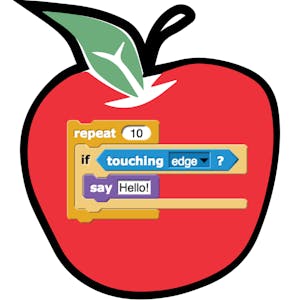Computational Thinking for K-12 Educators: Sequences and Loops
About this Course
How do we give instructions to a computer? Isn\'t programming hard? Not really! Whether it\'s giving someone directions to a nearby store or writing out some dance moves we frequently exhibit aspects of computational thinking in our everyday lives! This class teaches the first key concepts of programming -- sequences of instructions and basic counted repetition of instructions. For each concept, we\'ll start by helping you connect real-world experiences you are already familiar with to the programming concept you are about to learn. Next, through a cognitively scaffolded process we\'ll engage you in developing your fluency with problem solving with sequences and repeated instructions in a way that keeps frustration at a minimum. Along the way you will learn about the common challenges or \"bugs\" students have with these concepts as well as ways to help them find and fix those concepts. You\'ll also be guided in running classroom discussions to help students develop deeper understanding of these concepts. Finally, you\'ll learn about a recommended pedagogical practice, Pair Programming, and find out why research recommends teaching block-based programming first.Created by: University of California San Diego

Related Online Courses
This specialization provides a comprehensive curriculum designed for executives to master cyber risk management using the FAIR (Factor Analysis of Information Risk) model. Through four in-depth... more
The Advanced Kubernetes - Securing, Monitoring, and Scaling Kubernetes Clusters course is designed for individuals who want to gain expertise in securing, monitoring, and efficiently managing... more
This Specialization helps you improve your professional communication in English for successful business interactions. Each course focuses on a particular area of communication in English: writing... more
You have all heard about the DNA double helix and genes. Many of you know that mutations occur randomly, that the DNA sequence is read by successive groups of three bases (the codons), that many... more
In this course, you will explore the mechanisms and immune responses involved in autoimmune diseases and in hyper-responsive phenomena, such as asthma. You will examine in detail the potential... more







